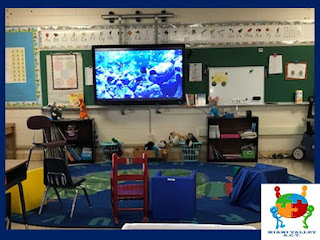Brittany has done an excellent job arranging her room with clear physical boundaries to help students know where they need to be and to help limit wandering.
Brittany increases this physical structure using flexible dividers which is a wonderful support for students who struggle to stay in the designated learning area or who may be easily distracted by the sensory-rich classroom environment.
In addition to physical supports, Brittany uses location-based interactive visual schedules to help students with transitions and to provide the expectation of where they need to be. Students take a schedule card off their schedules and place them in the cup at the corresponding location.
Her schedules are some of the most well differentiated schedules we have ever seen! Difficulty ranges from matching color cards to the schedule location color, matching picture icons, or matching words.
Brittany is also a master at differentiating learning activities. For her circle time, Brittany uses the Interactive Calendar Activities from Autism Adventures. These activities range from a simple calendar book, a calendar file folder, or a daily calendar worksheet. The floor desks are a great tool for students who are sitting at circle time and need a surface for completing activities.
Another way Brittany differentiates is through use of the STAR Program. The STAR program provides monthly thematic activities which Brittany modifies further to meet her student needs. Brittany's students are learning higher level vocabulary through activities they can easily access. For one planet lesson, students matched pictures through individual cards or a velcro worksheet or matching words to pictures through a file folder or a velcro worksheet. Students were engaged and excited and Brittany shared that she provides students with multiple opportunities to work on these activities to increase their understanding.
Brittany's use of the STAR Program carries over to her calendar time through correlating visual supports for the calendar numbers.
Brittany also uses visual supports to communicate activity expectations through the use of visual routines or mini-schedules.
This mini-schedule is used when students work independently in the structured work system area. Students match the picture icon to the corresponding bin or baggy to collect their work tasks for the day.
Visual supports are great for staff too! We love these great fine motor bins that can be used as morning work or anchor activities. The pocket chart shows which bin each student is working on and the easy lesson plan outlines the assigned activities for each day for quick resetting of the pocket chart.
We were also impressed with how effectively Brittany incorporates continuous reinforcement for her students who need frequent motivators. At the start of an activity, the student chooses a toy to work for. The basket has all of their favorite toys so that they are portable and easy for staff to access. While working, the student removes a penny token for every repetition completed. Tasks include materials from the STAR Program, imitation activities, and taskbox activities such as the pictured lunch tray activity. After all 5 pennies are removed, the student gets to play with the chosen toy for several minutes before the sequence is repeated. This quick succession of repetitions and reinforcement makes work time productive and motivating.
Despite the quick pace of 1:1 instruction and variety of differentiated tasks completed during group time, Brittany also keeps up on her progress monitoring using these awesome data sheets.
With all of these fantastic supports in place it is evident why Brittany is a great fit for our ALIST!









































